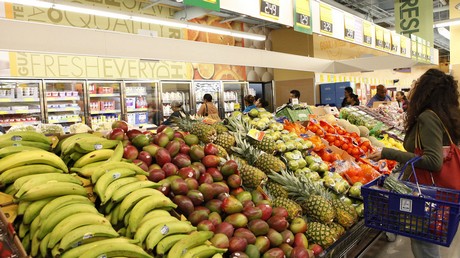 the produce section of your supermarket and you'll see things you'd never have seen years ago — like fresh raspberries or green beans in the dead of winter. Much of that produce comes from Mexico, and it's the result of the North American Free Trade Agreement — NAFTA — which took effect 20 years ago this month.
the produce section of your supermarket and you'll see things you'd never have seen years ago — like fresh raspberries or green beans in the dead of winter. Much of that produce comes from Mexico, and it's the result of the North American Free Trade Agreement — NAFTA — which took effect 20 years ago this month.In the years since, NAFTA radically changed the way we get our fruits and vegetables. For starters, the volume of produce from Mexico to the U.S. has tripled since 1994.
There are several reasons why, explains Jaime Chamberlain, president of J-C Distributing Inc., a large produce importer and distributorship in Nogales, Ariz.
First, NAFTA eliminated tariffs. Cantaloupes, for instance, used to have a 35 percent tax on them when they crossed the border. No tariffs meant lower prices.
Second, NAFTA encouraged investment. So companies like Chamberlain's have invested hundreds of millions of dollars in Mexican farms. That has helped create year-round supply and demand for U.S. and Canadian customers.
"Twenty years ago, in tomato items alone, you did not have 365-day distribution from Mexico to the United States," he says. "And now ... every single day of the year, you will find Mexican tomatoes in the U.S. market."
"I don't have much fruit in the winter — bluntly," says Joan Gussow, a nutritionist and author who has been called the "matriarch of the eat-locally-think-globally food movement." Gussow eats mostly dried fruit in winter and whatever vegetables grow near her home in New York's Hudson Valley. By selling fruits and vegetables bred to travel long distances, she says, NAFTA has helped train people to value convenience over flavor. "It's meant that people don't know anything about where their food comes from, and they don't know anything about seasons," Gussow says. "And so they really have settled — as they have with tomatoes — for something that is really like a giant orange golf ball."
Jaime Chamberlain disagrees. He says the produce industry has made great strides in packaging and shipping more flavorful fruits and vegetables from Mexico. Don't knock availability — celebrate it, he says. "We should be teaching our children that nowadays, you're able to enjoy strawberries even though you're in the dead of winter in January," he says.
Enjoy it or not, that's what Americans got from NAFTA. As for getting your children to eat more fruits and vegetables — that's another issue altogether.





